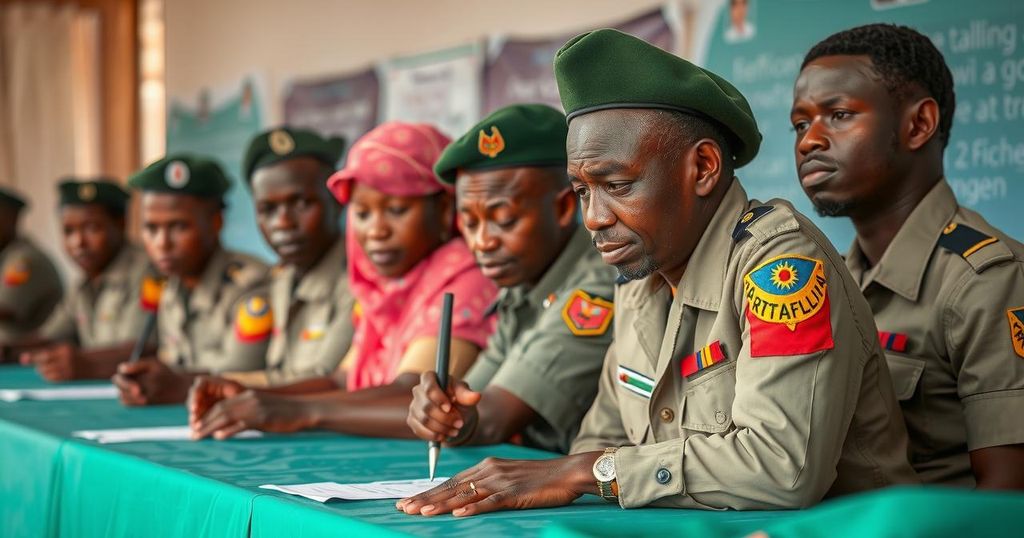Chad Faces Election Controversy Amid Opposition Boycott and Allegations of Fraud

Chad held legislative, provincial, and local elections after three years of military rule, amid a boycott by opposition groups and allegations of electoral fraud. Candidates aligned with Marshal Mahamat Idriss Itno dominate the election landscape, with reports of ballot irregularities and limited media coverage complicating the electoral process.
Chad commenced its electoral process on Sunday, holding legislative, provincial, and local elections intended to signify the concluding phase of a political transition following three years of military governance. Opposition factions have chosen to boycott the elections, resulting in a predominantly unchallenged landscape for candidates supporting Marshal Mahamat Idriss Itno. He assumed power post a military coup in 2021 and subsequently claimed legitimacy through a disputed presidential election in May that was widely criticized by opposition leaders.
Prominent opposition figure Succes Masra advised, “It is better to stay at home,” expressing dissent against what he termed a “system built on lies and electoral theft.” He alleged that preliminary vote tallies were predetermined, arguing that the integrity of the electoral process was compromised. On the eve of elections, the opposition Democratic Party of the Chadian People (PDPT) reported the suspicious disappearance of over a thousand ballots intended for Bongor, urging citizens to remain vigilant against potential electoral fraud orchestrated by the ruling party.
Polling began at 6 a.m. and continued until 6 p.m., with around eight million people eligible to cast their votes. The elections drew scrutiny from approximately one hundred foreign observers alongside representatives of various political factions. Voting commenced a day earlier for specific groups, including military personnel and police forces. The electoral process unfolded amidst persistent security challenges posed by Boko Haram and rising tensions from military disagreements with France, Chad’s historical colonizer.
Marshal Mahamat Idriss Itno, at age forty, inherited the presidency following the demise of his father, Idriss Deby Itno, who had ruled Chad for three decades. His elevation to power was swift, with the younger Itno succeeding claims to a five-year presidency in the controversial May election. Legislative elections had been delayed multiple times since 2011 due to unrest stemming from terrorism, economic obstacles, and the COVID-19 pandemic.
The establishment of a transition parliament consisting of 93 members was implemented through a presidential decree in 2021. The regime has faced increasing accusations of autocracy and repression, particularly following violent suppression during opposition demonstrations in October 2022. The elections proceeded amidst limited media coverage, largely due to an ongoing strike by online journalists protesting government-imposed restrictions, further exacerbated by the absence of financial support for local media to cover the electoral events.
In essence, the electoral process in Chad is marred by controversy, opposition boycott, and widespread allegations of fraud, casting significant doubt over the legitimacy of the elections and the government’s commitment to a successful political transition.
Chad has been under military rule since 2021, following the death of Idriss Deby Itno, who governed the country for thirty years. The current ruler, Marshal Mahamat Idriss Itno, has portrayed the upcoming elections as a crucial step towards reinstating democratic governance, although opposition voices argue that they are part of a manipulative strategy to maintain power. The opposition’s decision to boycott the elections highlights the ongoing tensions between the military government and dissenting political factions. Additional challenges include threats from jihadist groups like Boko Haram and media restrictions, complicating the political landscape further.
The recent elections in Chad highlight significant political strife and the troubling dynamics between the military-led government and opposition parties. The opposition’s boycott and allegations of electoral fraud raise concerns about the legitimacy of the electoral process. As Chad navigates its transition from military rule, the challenges posed by security threats and media restrictions may further hinder the establishment of a stable democracy, necessitating attention from the international community to ensure political accountability and humanitarian stability.
Original Source: www.barrons.com








